
Old Delhi by bicycle and New Delhi by car - Guided Tour
1 day
Con guía
Confirmación inmediata
Acerca de esta actividad
Itinerary
This is a typical itinerary for this product
Stop At: Chandni Chowk, Near Red Fort, New Delhi 110006 India
One of the oldest and largest enclosed bazaars in India, Chandni Chowk (Moonlit Square) is one of the most enticing and wonderful attractions in Delhi. Running through the middle of the walled city, Chandni Chowk is crammed with hundreds of shops, religious shrines and teahouses. It is an amazing experience to amble around the alleyways, looking and enjoying, or bargaining and buying. Here you can find almost anything, from electrical goods, clothes and jewellery, to mouth-watering delicacies. Built during the rule of Shah Jahan in 1650 AD, the bazaar grew by covering an increasingly large area of shops and storehouses with temples, mosques, gurudwaras, and subsequently it became the center of trading.
Duration: 1 hour
Stop At: Humayun's Tomb, Mathura Road Opp Nizamuddin Mosque, New Delhi 110013 India
This tomb, built in 1570, is of particular cultural significance as it was the first garden-tomb on the Indian subcontinent. It inspired several major architectural innovations, culminating in the construction of the Taj Mahal.
Located near the crossing of Mathura road and Lodhi road, Humayun’s tomb is the first substantial example of Mughal architecture in India. A forerunner of the Taj Mahal in Agra, this magnificent garden mausoleum of Humayun, the second Mughal emperor, was built by the emperor’s wife, Haji Begum. Inside the walled enclosure the most notable features are the garden squares (charbagh) with pathways water channels, centrally located well proportional mausoleum topped by double dome. In the grounds, you can also find other monuments including Khan's tomb.
Duration: 30 minutes
Stop At: Friday Mosque (Jama Masjid), 6 km North of Connaught Pl. across from Lal Qila, New Delhi India
The grand Jama Masjid of Delhi was built by Mughal Emperor Shah Jahan during 1650-1656. Situated on a hill near the Red fort, this largest mosque of India took 5,000 labourers 6 years to complete and pays testament to the vision and power of Shah Jahan, who is considered to be the most prolific builder among the Mughal emperors. The highly decorative mosque has three great gates, four towers and two 40 m-high minarets constructed of strips of red sandstone and white marble.
Duration: 30 minutes
Stop At: Qutub Minar, Qutb Minar, Mehrauli, New Delhi 110030 India
The earliest specimen of the Muslim architecture is the Qutub Minar, a gigantic 72m tower, with five distinct storeys, each marked by a projecting balcony tapering from a 15m diameter at the base to 2.5m at the top. Near the Qutub Minar lies Quwwat-ul-Islam, considered to be India's oldest mosque, built in 1199. Visitors will also find an Iron Pillar, dating back to the 4th century AD. It is said that if you can encircle it with your arms while standing with your back to it your wish will be fulfilled.
Duration: 30 minutes
Stop At: Red Fort (Lal Quila), Netaji Subhash Marg, New Delhi 110002 India
The Red Fort Complex was built as the palace fort of Shahjahanabad – the new capital of the fifth Mughal Emperor of India, Shah Jahan. Named for its massive enclosing walls of red sandstone, it is adjacent to an older fort, the Salimgarh, built by Islam Shah Suri in 1546, with which it forms the Red Fort Complex. The private apartments consist of a row of pavilions connected by a continuous water channel, known as the Nahr-i-Behisht (Stream of Paradise). The Red Fort is considered to represent the zenith of Mughal creativity which, under the Shah Jahan, was brought to a new level of refinement. The planning of the palace is based on Islamic prototypes, but each pavilion reveals architectural elements typical of Mughal building, reflecting a fusion of Persian, Timurid and Hindu traditions The Red Fort’s innovative planning and architectural style, including the garden design, strongly influenced later buildings and gardens in Rajasthan, Delhi, Agra and further afield.
This palace fortress is known as the Red Fort because of the red sandstone fabric of its rampart walls. The fort with its halls, palaces, pavilions and serene gardens was completed in 1648. Within the enclosure of the red fort are located many fairytale buildings. The Diwan-i-Khas (also known as Shah Mahal) and the Rang Mahal (also called Imtiyaz Mahal or palace of distinctions) are the two most conspicuous buildings inside the Red Fort. The Hall of Public Audience (Diwan-i- Aam) is another famous building within the Red Fort. Son-et-lumiere shows, tracing the history of the Mughal Empire in India, outlining their glory and the eventful causes for their downfall are held in the Red Fort every evening.
Duration: 30 minutes
Stop At: India Gate, Near Connaught Place New Delhi, New Delhi 110001 India
One of the main attractions of Delhi, India Gate was built as an ode to the fallen Indian soldiers of World War I. Designed by Sir Edwin Lutyens, the monument was completed in 1931. Another memorial, Amar Jawan Jyoti was added under the arch much later. The eternal flame burns day and night under the arch to remind the nation of soldiers who laid down their lives. During nightfall, India Gate is dramatically floodlit while the fountains nearby to make a lovely display with coloured lights and a large expanse of lush green lawns, which is a popular picnic spot.
Duration: 30 minutes
Leer más
Mostrar menos
This is a typical itinerary for this product
Stop At: Chandni Chowk, Near Red Fort, New Delhi 110006 India
One of the oldest and largest enclosed bazaars in India, Chandni Chowk (Moonlit Square) is one of the most enticing and wonderful attractions in Delhi. Running through the middle of the walled city, Chandni Chowk is crammed with hundreds of shops, religious shrines and teahouses. It is an amazing experience to amble around the alleyways, looking and enjoying, or bargaining and buying. Here you can find almost anything, from electrical goods, clothes and jewellery, to mouth-watering delicacies. Built during the rule of Shah Jahan in 1650 AD, the bazaar grew by covering an increasingly large area of shops and storehouses with temples, mosques, gurudwaras, and subsequently it became the center of trading.
Duration: 1 hour
Stop At: Humayun's Tomb, Mathura Road Opp Nizamuddin Mosque, New Delhi 110013 India
This tomb, built in 1570, is of particular cultural significance as it was the first garden-tomb on the Indian subcontinent. It inspired several major architectural innovations, culminating in the construction of the Taj Mahal.
Located near the crossing of Mathura road and Lodhi road, Humayun’s tomb is the first substantial example of Mughal architecture in India. A forerunner of the Taj Mahal in Agra, this magnificent garden mausoleum of Humayun, the second Mughal emperor, was built by the emperor’s wife, Haji Begum. Inside the walled enclosure the most notable features are the garden squares (charbagh) with pathways water channels, centrally located well proportional mausoleum topped by double dome. In the grounds, you can also find other monuments including Khan's tomb.
Duration: 30 minutes
Stop At: Friday Mosque (Jama Masjid), 6 km North of Connaught Pl. across from Lal Qila, New Delhi India
The grand Jama Masjid of Delhi was built by Mughal Emperor Shah Jahan during 1650-1656. Situated on a hill near the Red fort, this largest mosque of India took 5,000 labourers 6 years to complete and pays testament to the vision and power of Shah Jahan, who is considered to be the most prolific builder among the Mughal emperors. The highly decorative mosque has three great gates, four towers and two 40 m-high minarets constructed of strips of red sandstone and white marble.
Duration: 30 minutes
Stop At: Qutub Minar, Qutb Minar, Mehrauli, New Delhi 110030 India
The earliest specimen of the Muslim architecture is the Qutub Minar, a gigantic 72m tower, with five distinct storeys, each marked by a projecting balcony tapering from a 15m diameter at the base to 2.5m at the top. Near the Qutub Minar lies Quwwat-ul-Islam, considered to be India's oldest mosque, built in 1199. Visitors will also find an Iron Pillar, dating back to the 4th century AD. It is said that if you can encircle it with your arms while standing with your back to it your wish will be fulfilled.
Duration: 30 minutes
Stop At: Red Fort (Lal Quila), Netaji Subhash Marg, New Delhi 110002 India
The Red Fort Complex was built as the palace fort of Shahjahanabad – the new capital of the fifth Mughal Emperor of India, Shah Jahan. Named for its massive enclosing walls of red sandstone, it is adjacent to an older fort, the Salimgarh, built by Islam Shah Suri in 1546, with which it forms the Red Fort Complex. The private apartments consist of a row of pavilions connected by a continuous water channel, known as the Nahr-i-Behisht (Stream of Paradise). The Red Fort is considered to represent the zenith of Mughal creativity which, under the Shah Jahan, was brought to a new level of refinement. The planning of the palace is based on Islamic prototypes, but each pavilion reveals architectural elements typical of Mughal building, reflecting a fusion of Persian, Timurid and Hindu traditions The Red Fort’s innovative planning and architectural style, including the garden design, strongly influenced later buildings and gardens in Rajasthan, Delhi, Agra and further afield.
This palace fortress is known as the Red Fort because of the red sandstone fabric of its rampart walls. The fort with its halls, palaces, pavilions and serene gardens was completed in 1648. Within the enclosure of the red fort are located many fairytale buildings. The Diwan-i-Khas (also known as Shah Mahal) and the Rang Mahal (also called Imtiyaz Mahal or palace of distinctions) are the two most conspicuous buildings inside the Red Fort. The Hall of Public Audience (Diwan-i- Aam) is another famous building within the Red Fort. Son-et-lumiere shows, tracing the history of the Mughal Empire in India, outlining their glory and the eventful causes for their downfall are held in the Red Fort every evening.
Duration: 30 minutes
Stop At: India Gate, Near Connaught Place New Delhi, New Delhi 110001 India
One of the main attractions of Delhi, India Gate was built as an ode to the fallen Indian soldiers of World War I. Designed by Sir Edwin Lutyens, the monument was completed in 1931. Another memorial, Amar Jawan Jyoti was added under the arch much later. The eternal flame burns day and night under the arch to remind the nation of soldiers who laid down their lives. During nightfall, India Gate is dramatically floodlit while the fountains nearby to make a lovely display with coloured lights and a large expanse of lush green lawns, which is a popular picnic spot.
Duration: 30 minutes
Incluido
- Coffee and/or Tea
- Food tasting
- Local guide for bicycle tour of Old Delhi
- Use of bicycle
- Use of helmet
- Professional guide for tour by car of New Delhi
- Transport by private vehicle
- Hotel pickup and drop-off
- All applicable taxes
- Snacks
- Bottled water
No incluido
- Entrance fees for Red Fort
- Food and drinks, unless specified
- Gratuities
Adicional
- Confirmation will be received at time of booking
- Not recommended for pregnant travelers
- Travelers should have a moderate physical fitness level
- Not recommended for travelers with back problems
- Not wheelchair accessible
- No heart problems or other serious medical conditions
- Minimum age is 12 years
- Each bike has a small basket to hold personal belongings
- Please advise any specific food allergies at time of booking
- Tour is designed for those who are comfortable riding a bike; it's not recommended if you're unfamiliar with biking
- While fruit, vegetable and flower stands will be open, most other shops in the Delhi markets don't open until later in the morning, so shopping at the markets is not part of this tour
- Subject to favorable weather conditions. In the event of rain, the tour will be cancelled; if canceled due to poor weather, you will be given the option of an alternative date or full refund
- This is a private tour/activity. Only your group will participate
Características
Turismo
90%
Cultural
70%
Deportes
35%
Puede ser que también le guste
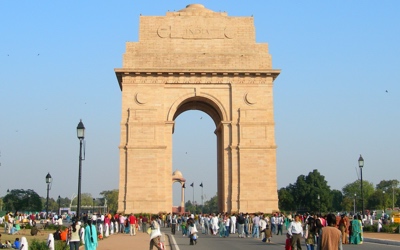


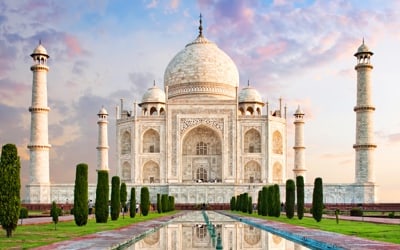
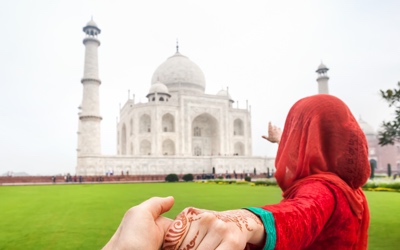
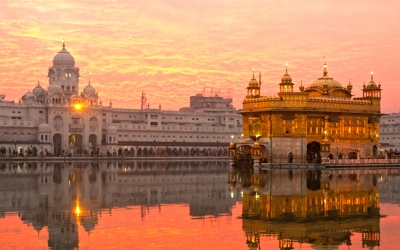

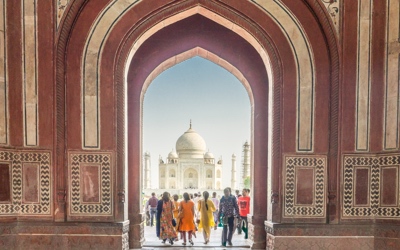

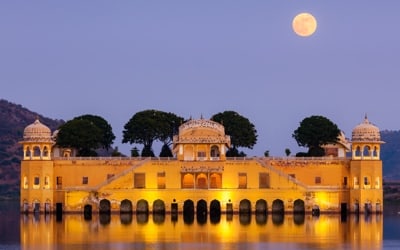 Ver todo 33 Colecciones
Ver todo 33 Colecciones
Haga clic para descubrir otras experiencias
Ver todo

Colecciones
City Tour
602 Actividades

Colecciones
Private Trip
455 Actividades

Colecciones
Private Tour
486 Actividades

Colecciones
Taj Mahal
657 Actividades

Colecciones
Taj Mahal Package
368 Actividades

Colecciones
Temple Tour
109 Actividades

Colecciones
Sunrise & Sunset
179 Actividades

Colecciones
Agra Trip
442 Actividades

Colecciones
Walking Tour
352 Actividades

Colecciones
Jaipur Trip
279 Actividades



